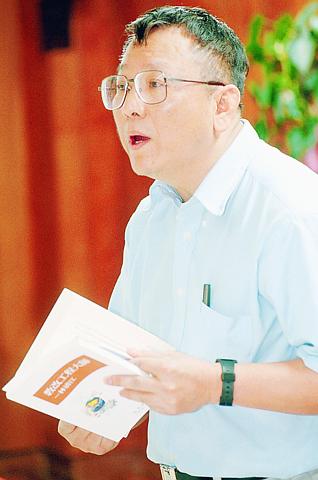The Control Yuan yesterday reached an agreement to impeach Minister of Education Ovid Tzeng (
The decision makes Tzeng the first educational minister in history -- and also the first Cabinet member in the newly formulated government -- to be impeached by the country's supreme watchdog body.
"The conclusion was made after careful consideration ? Nine out of 10 members of the special task force supported the impeachment decision. Tzeng breached two regulations -- Article 10 of the Nationality Law's Enforcement Statute (

TAIPEI TIMES FILE PHOTO
According to Article 10 of the Nationality Law's Enforcement Statute, employees of state-run education facilities are public officials and have to give up citizenship of other countries.
The Nationality Law was subsequently revised in February of this year, stating that only those who gain approval from their supervisors can hold dual citizenship and serve as the president of a national university.
When Tzeng held the previously stated three posts, he was in violation Article 10 of the Nationality Law's Enforcement Statute.
Even after the Nationality Law was amended, the minister still transgressed Article 20 of the newly revised Nationality Law on the ground that he never applied for approval from the Ministry of Education -- his direct supervisory unit at the time, Lin said.
"In August 1998, the Examination Yuan's Ministry of Personnel released an order to all public officials, requesting them to renounce dual citizenship within a year.
Tzeng ignored the directive. In March of 1999, when Tzeng bid to become the president of YMU, he promised that he would forsake his US citizenship if elected. He was elected and started his stint in June 1999. He then notified the school authorities that he would give up his US citizenship within a year.
The deadline to carry out this promise was June 29 of this year," Lin continued. "Though Tzeng stressed that he had gone to the American Institute in Taiwan to officially give up his US citizenship on June 5, the procedures were not completed until July 14, which was too late."
The related documents will be sent to the Committee on the Discipline of Public Functionaries (CDPF,
Member Li Shen-yi (
"The decision will not affect Tzeng's current post as the minister of education, but he is still liable for his misconduct in the past," he said.
Upon hearing the news, Tzeng said that he respected the decision made by the Control Yuan, adding that he would abide by the laws of the country. "If the impeachment is confirmed and the relating legal procedures are completed, I will do what is right according to the law."
Chung Chin (鍾琴), director of the Government Information Office (新聞局), told the media after being told the news that what Tzeng had done in the past did indeed leave plenty of room for criticism.
"We all feel regret about the consequences of his actions and will accept the decision made by the CDPF," she added.

SECURITY: As China is ‘reshaping’ Hong Kong’s population, Taiwan must raise the eligibility threshold for applications from Hong Kongers, Chiu Chui-cheng said When Hong Kong and Macau citizens apply for residency in Taiwan, it would be under a new category that includes a “national security observation period,” Mainland Affairs Council (MAC) Minister Chiu Chui-cheng (邱垂正) said yesterday. President William Lai (賴清德) on March 13 announced 17 strategies to counter China’s aggression toward Taiwan, including incorporating national security considerations into the review process for residency applications from Hong Kong and Macau citizens. The situation in Hong Kong is constantly changing, Chiu said to media yesterday on the sidelines of the Taipei Technology Run hosted by the Taipei Neihu Technology Park Development Association. With

CARROT AND STICK: While unrelenting in its military threats, China attracted nearly 40,000 Taiwanese to over 400 business events last year Nearly 40,000 Taiwanese last year joined industry events in China, such as conferences and trade fairs, supported by the Chinese government, a study showed yesterday, as Beijing ramps up a charm offensive toward Taipei alongside military pressure. China has long taken a carrot-and-stick approach to Taiwan, threatening it with the prospect of military action while reaching out to those it believes are amenable to Beijing’s point of view. Taiwanese security officials are wary of what they see as Beijing’s influence campaigns to sway public opinion after Taipei and Beijing gradually resumed travel links halted by the COVID-19 pandemic, but the scale of

A US Marine Corps regiment equipped with Naval Strike Missiles (NSM) is set to participate in the upcoming Balikatan 25 exercise in the Luzon Strait, marking the system’s first-ever deployment in the Philippines. US and Philippine officials have separately confirmed that the Navy Marine Expeditionary Ship Interdiction System (NMESIS) — the mobile launch platform for the Naval Strike Missile — would take part in the joint exercise. The missiles are being deployed to “a strategic first island chain chokepoint” in the waters between Taiwan proper and the Philippines, US-based Naval News reported. “The Luzon Strait and Bashi Channel represent a critical access

Pope Francis is be laid to rest on Saturday after lying in state for three days in St Peter’s Basilica, where the faithful are expected to flock to pay their respects to history’s first Latin American pontiff. The cardinals met yesterday in the Vatican’s synod hall to chart the next steps before a conclave begins to choose Francis’ successor, as condolences poured in from around the world. According to current norms, the conclave must begin between May 5 and 10. The cardinals set the funeral for Saturday at 10am in St Peter’s Square, to be celebrated by the dean of the College